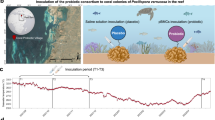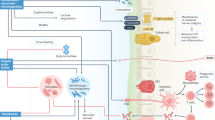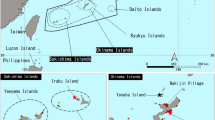Abstract
ALTHOUGH considerable work has been done on the digestive enzymes of snails and mussels1, very little is known about those of the marine chitons. Fretter, working with the two British species, Lepidochitona cinereus Gray and Acanthochilona crinitus Gray, has reported2 that the fluid in the sugar gland (a pouch-shaped organ connected with the œsophagus) hydrolyses starch, with a pH optimum at 5.6, and glycogen, with a pH optimum at 6.4–6.8.
This is a preview of subscription content, access via your institution
Access options
Subscribe to this journal
Receive 51 print issues and online access
$199.00 per year
only $3.90 per issue
Buy this article
- Purchase on Springer Link
- Instant access to full article PDF
Prices may be subject to local taxes which are calculated during checkout
Similar content being viewed by others
References
Florkin, M., Lozet, F., Arch. Internat. Physiologie, 57, 201 (1949). Jeuniaux, Ch., Mém. Acad. Roy. Belg., 28, 1 (1954).
Fretter, V., Trans. Roy. Soc. Edin., 59, 119 (1937).
Author information
Authors and Affiliations
Rights and permissions
About this article
Cite this article
MEEUSE, B., FLUEGEL, W. Carbohydrases in the Sugar-Gland Juice of Cryptochiton (Polyplacophora, Mollusca). Nature 181, 699–700 (1958). https://doi.org/10.1038/181699a0
Published:
Issue Date:
DOI: https://doi.org/10.1038/181699a0
This article is cited by
-
A substrate-film method for the histochemical demonstration of cellulase
Histochemie (1968)
-
A note on the amylolytic breakdown of some raw algal starches
Planta (1962)
Comments
By submitting a comment you agree to abide by our Terms and Community Guidelines. If you find something abusive or that does not comply with our terms or guidelines please flag it as inappropriate.



